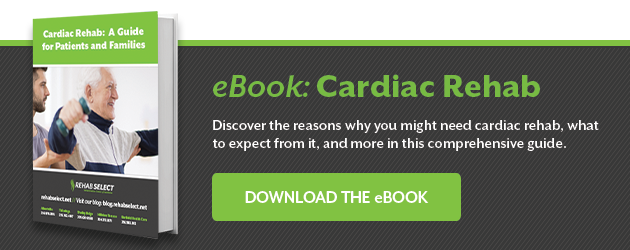
You recently suffered from a heart attack – and while it was scary, you’re starting to feel better. You’re following your doctor’s orders by eating heart-healthy foods, exercising, and reducing stress wherever possible. So why does your doctor still think you need a cardiac rehabilitation program?
It turns out that a cardiac rehab program is valuable for people with a wide range of heart diseases. From chest pains to heart transplants, all conditions in which the cardiac system has faltered need long-term attention.
Let’s take a closer look at what cardiac rehab is and how it can help you return to life as you knew it before a cardiac event.
What is Cardiac Rehab?
The American Heart Association defines cardiac rehab as a medically supervised program that consists of exercise training, education on heart-healthy living, and counseling to reduce stress and help patients become active again. A cardiac rehab program offers a multifaceted and highly individualized approach to improve the overall physical, mental, and social health of people with heart issues.
What is the Benefit of a Medically Supervised Rehab Program for Cardiac Patients?
According to the Centers for Disease Control (CDC), cardiac rehab helps men and women, people of all ages, with a range of mild, moderate, and severe heart problems.
You may benefit from a cardiac rehab program if your medical history includes:
- Heart attack
- Coronary artery disease
- Heart failure
- Peripheral artery disease
- Chest pain (angina)
- Cardiomyopathy
- Certain congenital heart diseases
- Coronary artery bypass surgery
- Angioplasty and stents
- Heart or lung transplant
- Heart valve repair or replacement
- Pulmonary hypertension
How Can Cardiac Rehab Help?
The CDC has found specific ways that cardiac rehab can benefit your health in both the short and long term, including:
- Strengthening your heart and body after a heart attack.
- Relieving symptoms of heart problems, such as chest pain.
- Building healthier habits, including exercise, quitting bad habits like smoking, eating heart-healthy foods. You may have access to a nutritionist to teach you how to make and recognize heart-healthy meals.
- Reducing stress with methods like meditation, hobbies, and therapy.
- Improving your mood. People often feel depressed after a heart attack.
- Increasing your energy and strength so you can power through your daily life more easily.
- Helping you take your medication with reminder calendars, pill boxes, and other methods.
- Preventing future heart problems and death.
Studies have found that a cardiac rehab program decreases the chances you will die in the five years following a heart attack or bypass surgery by around
20% to 30%
What’s Involved in Cardiac Rehab?
Every patient’s program is different, but there are generally four phases of cardiac rehab that most patients experience:
Phase 1: Hospitalization
It could be you’ve already experienced part of your rehab when you were hospitalized. Clinicians may start you on a limited exercise regimen and instruct you on how to take your medications. You'll receive a discharge plan and, based on the assessment you were given, may be assigned a physical therapist for outpatient care.
Phase 2: Subacute Outpatient Care
This phase moves you toward independent care. The primary focus of this three- to six-week phase is close monitoring of your recovery. You will also receive more training on how to manage your condition.
Phase 3: Intensive Outpatient Rehab
At this stage, cardiac rehab turns into a “lifestyle change” program and introduces more independent exercises and self-monitoring. Typically, it will comprise 36 outpatient sessions, although that varies. Education at this stage will focus on nutrition, healthy lifestyle practices, and stress management.
Phase 4: Maintenance
By this time, you know how to manage your heart condition. You’ll continue to follow the same regimen you were on for exercise, nutrition, and lifestyle and will visit your doctor regularly.
What Might My Plan Look Like?
Although these phases are well-known, putting them into practice can vary greatly depending on each patient’s complex case. To help you navigate your cardiac treatment, the staff at Rehab Select will create a personalized cardiac rehab plan for you based on your needs.
A personalized cardiac rehab plan may include the following:
- A supervised exercise regimen that evolves as you improve
- Patient education and wellness programs, like cooking demonstrations
- Nutrition counseling
- Smoking cessation counseling
- Stress management
- Individualized risk management recommendations with regular evaluations
- Physical and occupational therapy
- Psychological and pharmacological counseling
- Referrals to other medical areas as necessary
Insurance and Medicare Coverage for Cardiac Rehab
While you'll have to check with your specific insurance provider, your cardiac rehab program may be covered. For example, Medicare provides coverage for cardiac rehabilitation or physical therapy for most heart conditions. Specifically, Medicare Part B (Medical Insurance) covers these comprehensive programs if you’ve had at least one of these conditions:
- A heart attack in the last 12 months
- Coronary artery bypass surgery
- Current stable angina (chest pain)
- A heart valve repair or replacement
- A coronary angioplasty (a medical procedure used to open a blocked artery) or coronary stent (a procedure used to keep an artery open)
- A heart or heart-lung transplant
- Stable chronic heart failure
Part B covers regular and intensive cardiac rehabilitation programs. Medicare covers these services in a doctor's office or hospital outpatient setting (including a critical access hospital).
Check with Medicare, your medical team, and your insurer to make sure cardiac rehab is covered under your plan.
Find Cardiac Rehab in Alabama
At Rehab Select, we offer specialized cardiac rehabilitation in Alabama for both acute and chronic heart conditions. Our experienced staff can guide you through the phases of cardiac rehab at one of our five Alabama locations with a personalized, physician-led program to improve your heart health and quality of life. Your healthcare team will evaluate your medical history and health to make sure you're ready to start a cardiac rehabilitation program.
Contact us to learn more about cardiac care in Alabama at Rehab Select.





